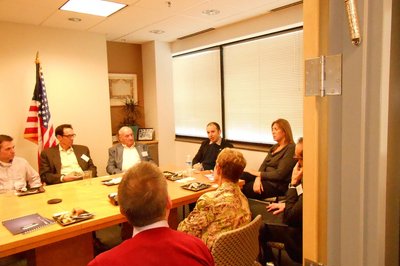The Consulate General of Israel to the Mid-Atlantic Region hosted Israel’s leading LGBT-equality organization in Philadelphia last week.
Two representatives of The Aguda, the Israeli National LGBT Taskforce, discussed their work in Israel and abroad Jan. 11 with a host of local LGBT leaders, including Rep. Brian Sims (D-182nd Dist.), Mazzoni Center executive director Nurit Shein, businessman Mel Heifetz, Equality Forum executive director Malcolm Lazin, William Way LGBT Community Center executive director Chris Bartlett and attorney Abbe Fletman.
The Aguda was founded in 1975 by six individuals who were at the frontier of LGBT rights in Israel. According to chairperson Shai Doitsh, Israeli law has come a long way since that time in terms of LGBT rights.
“In 1975, the law in Israel was to criminalize gay sex. Although no one was ever arrested because of it, it was still illegal, which made it a very tough social problem,” Doitsh said.
Since its founding, the focus of The Aguda has changed tremendously, he added.
“The organization started as ‘GL’ to now ‘LGBTQ. We started as a human-rights and advocacy organization and realized that we needed to work in other fields to create a community like social services and legal aid.”
Doitsh considers The Aguda a “one-stop shop” for the LGBT community.
“Every need that the community has, the organization is there to give it, “ he said. While Israel has evolved on LGBT-rights issues, Doitsh said his agency is committed to ensuring that the legal landscape remains steady.
“Israel is one of the most advanced countries in the world with LGBT rights, so our attention is basically on the parliament to make sure that we will remain equal,” he said.
Doitsh said both Israeli society and the organization itself are very volunteer-oriented, which has resulted in 750 agency volunteers, with that number jumping to several thousand during Pride events.
Besides Tel Aviv’s Pride event, Doitsh said Israel has two other Pride events, including one in Jerusalem and a new event in Haifa, in northern Israel.
Jerusalem Pride is held every August and is a demonstration for human rights.
“It is not commercial; you will not see any floats in it. It is really a march for our rights in front of our parliament.”
The Aguda has produced Pride events in the past but now focuses its attention on Pride events outside Tel Aviv, since the city’s municipality both produces and pays for the event, which draws about 100,000 people.
“We hope municipalities eventually will produce their own Prides as well,” Doitsh said.
The Aguda has also had an increased focus on transgender issues in recent years.
In 1998, the organization sent transgender singer Dana International to the Eurovision Song Contest, something Doitsh said was an unprecedented step towards trans equality.
“In those days, sending a transgender woman as Israel’s official representative was a huge thing. She actually won the competition and a transgender woman brought pride to Israel,” Doitsh said.
The Aguda is also the country’s first non-governmental organization to install a transgender woman as its chairperson, which occurred in early 2000. Doitsh also noted that the agency’s executive director is a transgender woman.
“We have transgender individuals who are the leaders of our community,” he said. “Most of our clients are transgender people who need legal and social aid. We are trying to improve the quality of life for transgender people in Israel.”
The Aguda also works with Israeli youth.
Doitsh said suicide among LGBT youth in Israel is an epidemic that has been building every year, especially because of cyber-bullying.
The organization just completed a survey with the Ministry of Health in Israel that revealed 50 percent of LGBT youth are at risk of committing suicide.
The Aguda helps teens who were either kicked out or dropped out of the education system because of bullying or family rejection.
“We help them get a high-school diploma in order for them to go back into the circle of life and not out in the streets with drugs or prostitution,” Doitsh said.
It also operates a program known as BarNoar, which offers a safe environment for at-risk youth during especially at-risk hours, where they manage a nonalcoholic bar in a nonjudgmental atmosphere.
“They serve the drinks and they make the food and they are in charge of the place without any tagging or labels. No one asks them if they are gay. They can choose how to identify — female or male. It is the only time during the week that they can be open.”
Doitsh said the organization has worked to be inclusive of the Arab community — which often doesn’t have access to LGBT-related information — by translating its website and hiring Arab social workers, speakers and attorneys.
While some critics have accused Israel of “pinkwashing” — or using a platform of LGBT equality to mask Palestinian inequality — Doitsh said he’s eager for Americans to see the country that exists beyond the conflict.
“We live our life in Israel and we have more sides of Israel than the Israeli/Palestinian conflict, and by coming here and talking to people, we’re showing other sides of Israel. It doesn’t mean that we don’t have a conflict or that we are perfect, but we want to show other sides of Israel,” he said. “The country didn’t give us our rights, we fought for it. We fought for it in court — as individuals and the community. The Israeli state gave us the atmosphere and the ability to do that and that is the real key. We are the most advanced country in gay rights and we are proud of that, so why hide it? I wish that every country will get there.”
